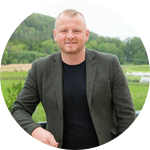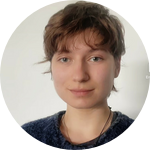Project Results
This experiment has provided us with valuable insight into the effect of additive profiles on the flocculation rate of the microalgae species Spirulina and Chlorella vulgaris. Our four weeks of study of the effect of whey protein and iron filings have shown that whey protein powder led to an average increase in biomass density production of 7.2%.
The experiment was carried out using a base growth cycle as our constant which contained Spirulina (10g dry weight), 2l distilled water and 5g f/2 growth enhancer, and a comparison growth cycle containing Spirulina (10g dry weight), 2l distilled water and 5g f/2 growth enhancer, 5g dry weight whey powder.
Both were kept under the same growth conditions at 22 degrees C (with some minor variation), illuminated by LED light strips with a 16 hours illumination, 8 hour dark phase and bubble cycle using natural air, to simulate natural day and night periods within acrylic bioreactors. pH was variable due to the effects of the additives, but was generally between 6-8.7.
They were monitored daily Monday to Thursday for a period of four weeks and lux was recorded each day using a luxometer which was used to calculate flocculation rate. The ambient lab temperature, internal temperature of the growth vessels, and pH of the growth medium was also recorded, along with any other remarks on changes to the system.
About This Project
To stop the negative effects of climate change we need carbon capture technology to be developed and deployed worldwide as soon as possible. Nellie is a direct air carbon capture system that is able to help solve this global problem using microalgae. We have a working prototype and now need to test certain additives which will increase the efficiency of our system and accelerate the at-scale removal of Carbon Dioxide from the atmosphere and mitigate the effects of climate change.
Ask the Scientists
Join The DiscussionWhat is the context of this research?
Carbon Dioxide Removal (CDR) is vital to stopping climate change, as stated in the IPCC’s 6th AR and the European Green Deal. There are many types of CDR but direct air capture by microalgae is a promising, low-cost high-efficiency technology that can immediately remove and permanently store atmospheric CO2 (Erans et al., 2022). Algae convert CO2 to O2 and biomass by photosynthesis, at a higher efficiency that terrestrial plants, and the biomass product is permanently stored or processed into bioenergy, fertiliser, etc. The CDR sector is in its infancy, so there are not yet accessible technologies that offer scalable carbon capture that can be deployed in the necessary locations and environmental conditions.
What is the significance of this project?
Our feasibility studies and technoeconomic analysis predict a capture rate of about 50,000 tonnes CO2 per acre per annum. It is envisaged that an additive profile exists that should increase this rate 5%, hence the need to test several additives. Algal carbon capture rate varies in different substrates, so finding the materials that help it photosynthesise as efficiently as possible will let us design the best CDR system we can and prepare it for use so we can start solving the global issue of CO2 emissions and global warming. This project also has the potential to kickstart new questions around how to improve our carbon capture technologies and measure their effectiveness, generating new scientific knowledge which can be shared in efforts to improve carbon capture globally.
What are the goals of the project?
These funds will be used to acquire additives that will be added to test bioreactors in different quantities to find which profile of additives will increase photosynthetic rate the most, i.e., which additive profile will help our systems capture the most CO2. We will build several small reactors with different additive profiles and monitor biomass and biogas production for four weeks using a remote sensor stack. We will then analyse the data to determine which additives cause the most productivity. Testing will take place at AberInnovation in mid Wales over a period of four weeks starting in early January 2023. A full report on the project's outputs will be prepared and disseminated publicly.
Budget
Our budget covers the time and materials needed to complete the project. The hardware, input feedstock and additives are essential - we need to acquire the materials to build test reactors, plus the feedstock and the additives we are testing. Without them there is no project. The sensor stack lets us monitor the reactors 24/7 to obtain highly accurate and precise data, resulting in the optimal additive profile. The computer hardware and software is needed for efficient data analysis so the project is carried out quickly and to a high scientific standard.
The project will happen in January 2023 at AberInnovation in mid-Wales which is an enterprise innovation from Aberystwyth University where we carry out our lab work.
Whilst we have funding for the lab, we cannot start the project until we can fund the materials itemised, so this money is critical for completing the project and developing the additive profiles we need for our carbon capture system.
Endorsed by
 Project Timeline
Project Timeline
The project lasts four weeks starting February 2023
Project Planning: Design project methodology and deployment strategy
Additive Profile Bench Testing: Build small test reactors to find additive profile that increases efficiency by remote and onsite monitoring and reporting
Feedstock Processing Analysis: Explore feedstock processing with evaporation, fractionation and drying.
Project Reporting: Collate and analyse data, share specified data sets
Dec 15, 2022
Project Launched
Feb 01, 2023
Planning the project's technical design so we have a sturdy methodology and deployment strategy.
Mar 01, 2023
Additive profile bench testing until we have identified the most efficient profile for carbon capture.
Mar 15, 2023
Feedstock processing analysis to make sure increased efficiency from additives does not affect processing and extraction efficiencies.
Mar 29, 2023
Project reporting to analyse all our data and selected data dissemination.
Meet the Team
Stephen Milburn
Stephen is a physicist by training and a software engineer and project manager by trade.
Founder and CEO at Nellie where we're developing world-class carbon capture and storage systems.
With over ten years’ experience leading a team of nine to deliver complex industrial products to a range of clients across multiple sectors.
Ally Sheller
Ally is Nellie's scientific assistant who has two years of experience in the field of biotechnology and climate change research at Aberystwyth University, and has a strong commitment to developing methods of preventing and mitigating climate change within the sphere of biology.
She joined Nellie as an opportunity to apply the knowledge from her degree in Biology and Climate Change to real-world solutions to climate change and make a positive contribution to improving sustainability. She has been responsible for designing the methodology of previous bench tests for Nellie and has a background in reporting on factors influencing micro algae growth, and the current status of governmental goals to mitigate climate change. Ally will carry out day-to-day management of the two bench test work packages and produce MRV (monitoring, verification and reporting) packages.
Andrew
Andrew has worked for several years in industrial liaison and marketing and will connect with relevant industrial and academic stakeholders during the project. Andrew has already generated partnerships with potential demonstrator sites and has been instrumental in creating a consortium of aligned clean tech businesses in the UK and Europe to advance the development of Nellie.
Andrew will manage project administration and dissemination works which he has previously carried out in other R&D projects at Nellie.
Project Backers
- 8Backers
- 106%Funded
- $5,320Total Donations
- $665.00Average Donation




